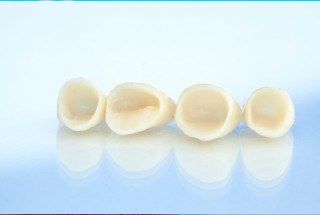Dental Crowns – McKinney, TX
Restoring Damaged Teeth with Dental Crowns
It’s not uncommon for patients to sustain tooth damage due to an unexpected injury or unforeseen issue. For teeth that have been compromised, a dental crown is often one of the best possible solutions. Whether you need one for restorative or cosmetic purposes, a dental crown is certain to restore your smile to a beautiful and complete state that’ll have your confidence soaring! Keep reading to learn a little more about dental crowns in McKinney and their capabilities, or feel free to give us a call to schedule a consultation or request additional information.
Why Choose Marble Dental McKinney for Dental Crowns?
- Strong, Tooth-Colored Crowns Available
- Friendly & Skilled Dental Team
- Sedation Options for Patients with Anxiety
What Is a Dental Crown?

To put it simply, a dental crown is a custom-made cap that’s meant to fit over the biting surface of a compromised or damaged tooth above the gumline. It can be made from a variety of materials including tooth-colored ceramic and zirconia, among others. Crowns are an incredibly versatile restorative solution and can be utilized in the following situations:
- A tooth is broken and needs additional support to stay in one piece.
- A tooth is severely decayed, and the filling requires support.
- Root canal therapy has been performed on the tooth.
- A dental bridge needs to be anchored to abutment teeth.
- A tooth is severely misshapen or discolored.
The Dental Crown Process

The process for receiving a dental crown is relatively straightforward, and we’re happy to walk you through every single step. When you come in for your consultation, we’ll first examine your mouth to determine if a crown can be used to address your situation. If you’re deemed an eligible candidate, we’ll begin the process by removing a thin layer of enamel from the tooth in question to prepare it for the crown—but this is nothing to be worried about, and simply allows the crown to lay flush with your surrounding teeth once it’s secured!
We’ll also take an impression of your teeth that’s necessary for the fabrication of your crown. While your permanent crown is being made, you’ll be outfitted with a temporary crown to protect the prepared tooth. But once your crown is good to go, we’ll call you back in to bond it. You’ll also be given instructions for how to properly care for it so that it lasts for several years.
The Benefits of Getting a Dental Crown

Dental crowns are one of the most common treatments that we conduct here at Marble Dental McKinney, but if you’re still on the fence about them, here are some of their priceless benefits:
- They improve your ability to chew comfortably.
- They actively reduce the risk of worsening oral health problems in the future.
- They prevent your natural teeth from needing to be extracted.
- Their lifespan can exceed 15 years with proper care.
- They’re completely customized to look realistic and feel natural.
If you believe that a dental crown might assist your smile, don’t hesitate to call us today to set up an appointment. Getting a dental crown in McKinney might easily save your smile some trouble down the road!
Understanding the Cost of Dental Crowns

How much will your dental crown cost? This is likely to be one of the first questions on your mind when we recommend the treatment. There’s no universal price tag for dental crowns since there are multiple factors that can affect the final cost; as such, our team will need to examine your mouth and learn more about your situation before creating an estimate for you. Rest assured that we’re here to help you get the care you need at an affordable price!
Factors That Affect the Cost of Dental Crowns

Some of the variables that can influence the cost of dental crowns include:
- The Number of Teeth Involved: Obviously, you only need to get one dental crown to repair a single tooth. But if multiple teeth were damaged, you will likely have to pay for additional crowns.
- The Need for Additional Dental Work: Are you getting a dental crown to protect a tooth after root canal treatment? Or will it be combined with a dental implant to fill a gap in your smile? It’s important to be aware of the costs of any additional treatments that you’re undergoing.
- The Material Used: Our practice can provide crowns made out of tooth-colored ceramic and zirconia. The type of material used can ultimately influence the price of your restoration. Remember, the quality of your crown is often reflected by the amount you pay; if it’s made out of cheaper materials, it may not last as long.
Does Dental Insurance Cover Dental Crowns?

The short answer is usually yes; you can normally expect your dental insurance to help pay for a dental crown as long as it has been deemed necessary. Most of the time, dental crowns are classified as major dental care, and as such many dental insurance companies will pay around 50% of the cost of the procedure.
Of course, there are many dental insurance plans to choose from, and each has its own rules about the coverage it provides for dental crowns and other treatments. If you call your dental insurance provider, you can clarify the details of your plan and get a clear picture of what your coverage looks like.
Our team strives to make taking advantage of your dental insurance benefits as simple as possible. We can go over your plan with you to address any questions or concerns you might have, and we’ll do what we can to help you maximize your benefits.
Options for Making Dental Crowns Affordable

How can you make paying for dental crowns easier if you don’t have dental insurance? One option is to sign up for our in-office membership plan, which comes with many of the benefits of a traditional insurance plan but without any yearly maximums or waiting periods to worry about. Additionally, you have the option of pursuing financing through Cherry or CareCredit so that you can pay for your care in smaller, more manageable installments.
Dental Crowns FAQs

If you’re struggling with a tooth that’s severely damaged or decayed, you might be wondering what your options are for addressing the issue and saving it; with a dental crown in McKinney, your tooth has some pretty incredible odds! That said, it’s natural to want to know as much as possible about any type of treatment before committing to it. Our team has gathered a few of the most frequently asked questions that we receive about dental crowns so that you can feel comfortable and confident about saving your smile. Of course, if you have any other questions about dental crowns or would like to schedule a visit, please give us a call!
Does It Hurt to Get a Dental Crown?
Just like when you receive a filling, we’ll numb your mouth around the tooth that’s receiving a dental crown. It usually just takes a topical anesthetic, but sedation options are also available for patients with dental-related anxiety. This means you shouldn’t feel much discomfort at all during the tooth preparation phase! Even though you’ll be numbed for the first appointment, you might not require an anesthetic for the final crown placement. It’s also not uncommon to experience some sensitivity for a few days following the restoration, though this can easily be managed with over-the-counter pain relievers.
Are Dental Crowns Covered by Insurance?
The short answer here is yes, but not always, and not in full. Since every dental insurance plan is different, you’ll want to check the specifics of your coverage beforehand. That said, most plans consider crowns to be a major procedure, so they’re often eligible for 50% coverage after you’ve met your plan’s deductible and before you’ve exceeded your annual maximum. Dental insurance typically only covers crowns if they’re deemed as a medical necessity—such as to repair a tooth with decay or damage. If you’re hoping to get a crown for solely cosmetic purposes, it might not qualify for insurance coverage.
How Long Do Dental Crowns Last?
On average, you can expect your crown to last somewhere between 5 to 15 years, but this usually varies depending on the material the crown is made from. Metal crowns generally have a longer lifespan than metal-free ones, but not always (though the difference is often negligible). The longevity of your crown also depends on other factors such as your diet, oral hygiene, and whether you have any bad oral habits (smoking, nail-biting, teeth-grinding, etc.). It’s also worth noting that crowns on front teeth may last slightly longer than crowns on molars, since they’re not subjected to quite as much wear and tear from chewing.
How Do You Know When a Dental Crown Needs to Be Replaced?
The only way to know for sure whether a crown needs to be replaced is to have X-rays taken or to have it visually examined by a professional. However, there are still certain warning signs that often indicate a crown is nearing the end of its lifespan. Including:
- Pain – If there’s decay underneath your crown, it needs to be removed so that the cavity can be treated. From there, we can evaluate whether the crown can be reseated onto the tooth or replaced altogether.
- Instability – If it feels like your crown is loose, especially whenever you’re biting into something or chewing something sticky, you should contact us to have your mouth examined.
- Noticeably worse appearance – Sometimes crowns can sustain damage; if yours is chipped, cracked, or even discolored, it can affect your self-esteem in addition to your tooth’s functionality.
- Dark line along the base – This might indicate the crown has been through a great deal of wear and tear and might need replacement in the near future.

